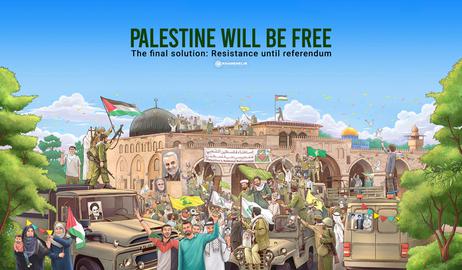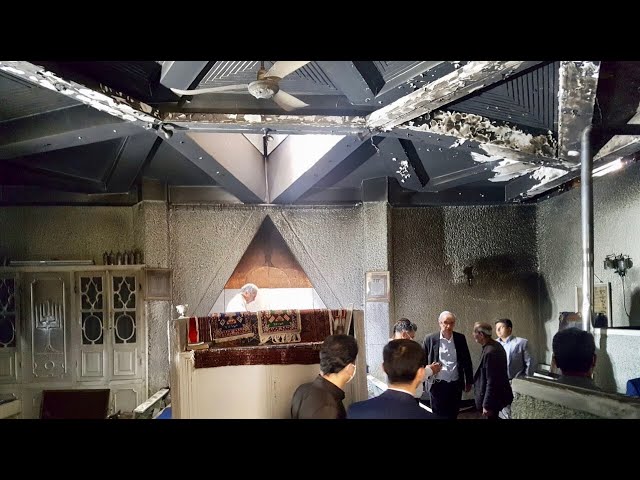“The West Bank must be armed, just as Gaza,” the Supreme Leader Ayatollah Khamenei tweeted on Monday, May 18. “The only thing that can reduce Palestinians’ hardships is the hand of power. Compromise won’t reduce a bit of the cruelty of this usurping, evil, wolf-like entity.”
At the same time the Leader was proclaiming that the only way Palestinians can regain their rights is through arming themselves, his website published a poster promising that “resistance until referendum” in Palestine would bring about the “final solution” to the Israeli-Palestinian conflict. The use of the term “final solution” was menacing and calculated, given, of course, that it was the phrase Adolf Hitler and the Nazis used for the massacre of European Jews. It was Hitler’s “final solution” that culminated in the Holocaust and the genocide of the Jews, especially in Poland and other Eastern European countries.
The incendiary language came just days after an attack on one of the most sacred Jewish sites in the world, the shrine of Esther and Mordechai in Hamedan, Iran. Although no serious damage was done to the shrine, which is also an Iran heritage site, rumors that members of the Student Revolutionary Guards were behind the fire on May 14 could signal renewed hostilities toward Iran’s Jewish communities and even greater tensions with Israel.
The poster on Khamenei’s website depicts armed men holding photographs of the ayatollah, as well as of Hassan Nasrallah, the Secretary General of the Lebanese Hezbollah, General Ghasem Soleimani, the assassinated commander of the expeditionary Quds Force, and his successor General Ismail Qaani, and Palestinian and Lebanese Hezbollah flags.
The plan to arm the West Bank originated with General Soleimani, who was killed on January 3 by an American drone strike outside Baghdad Airport. “The world must know that disarmament is a futile vision, an unachievable illusion and a confused dream that will never be realized,” Soleimani said six years ago. “Disarming the resistance is a ridiculous dream that will end up in a grave.”
Soleimani’s formidable language left no question as to what he hoped would happen in that volatile part of the Middle East. “Ghasem Soleimani turned Gaza, the West Bank and the north of Palestine into a fire zone against the Zionists,” said General Hossein Salami, commander in chief of the Revolutionary Guards, recently. The truth, however, is that the Islamic Republic has never achieved the same level of influence in the West Bank, the seat of the Palestinian authority, that it enjoys in Gaza.
Gaza has close relations with the Islamic Republic through Hamas, or the "Islamic Resistance Movement,” which at one time held the premiership of the Palestinian Authority. Despite a short disruption to their relations caused by Iran’s support for the government of the Syrian president Bashar al-Assad, the Islamic Republic regime continues to support Hamas politically, financially and militarily.
The Meeting that Never Happened
But there are no similar relations with the Fatah movement in the West Bank. The Islamic Republic has never had close relations with Mahmoud Abbas, the leader of Fatah and the president of the Palestinian Authority. Abbas has traveled to Iran only once, to participate in a meeting of the leaders of the Non-Aligned Movement but, after the meeting was over, he left Iran without meeting Ayatollah Khamenei. Whether Abbas did not request a meeting or Ayatollah Khamenei did not grant one, the meeting that never happened is a good indicator of the lack of warmth in relations between the two sides.
So the Supreme Leader’s decision to raise the issue of arming the West Bank again makes it clear that the Islamic Republic has had no success in influencing the stronghold of Fatah over the last six years.
All of this is taking place against a background where, in recent months, direct clashes between Iran and Israel have escalated to an unprecedented degree. Israel has been firing missiles on bases in Syria that are, one way or another, connected to the Revolutionary Guards. And recently, the two sides have escalated their cyber-attacks against one another as well, including attacks that have had direct impact on infrastructure.
Recently it was reported that, in retaliation for an earlier attempted cyberattack on rural water distribution systems in Israel, Israel launched a cyberattack on computers at Iran’s Shahid Rajaie port in southern Iran that caused massive backups on waterways and roads leading to the facility.
As violent tensions between Israel and Iran have escalated and in the wake of Ghasem Soleimani’s assassination by the United States, Khamenei is repeating his call to arm the West Bank. He apparently expects his call to be welcome by the Palestinian leaders, though this expectation is unrealistic. But the call could further escalate Iranian-Israeli tensions or, at the very least, justify Israeli actions.
To better understand the possible reverberations of Khamenei’s call, let us imagine a reverse situation. How would the Islamic Republic respond if the Israeli prime minister Benjamin Netanyahu had announced that Iranian people must be armed so they can fight for their legitimate rights and to address their grievances?
visit the accountability section
In this section of Iran Wire, you can contact the officials and launch your campaign for various problems






![“Compromise won’t reduce a bit of the cruelty of this usurping, evil, wolf-like entity [Israel],” tweeted Khamenei “Compromise won’t reduce a bit of the cruelty of this usurping, evil, wolf-like entity [Israel],” tweeted Khamenei](https://static.prod.iranwire.com/_versions_jpg/filer_public/1f/52/1f524a62-771f-4ea7-9de9-81784a07f245/bombing__v516x270__.jpg)






















comments